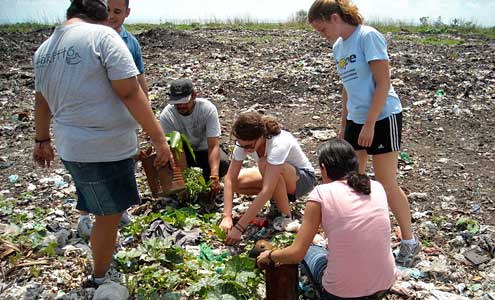
Eleven students and two professors are in Managua, Nicaragua, for a month for a service-learning experience combining health care, communication and service.
With communication professor Steven Giles and health and exercise science professor Gary Miller, the students are studying global health issues and using a variety of communication techniques to promote healthier lifestyles among the local people.
Before traveling to Central America, the students spent two weeks on campus taking two classes — one on global nutrition and health and the other on communication in developing countries. Miller’s background is in health statistics and the clinical aspects of health care. Giles focuses on modifying behavior through preventative health care education. It is the second year that Miller and Giles have taught the courses and taken students to Nicaragua.
“There are both positive and negative aspects to life in developed, industrialized areas versus rural ones,” Miller said. “Good health isn’t just about whether a person has the willingness to walk or bike or eat healthy, but whether the environment in which he or she lives supports these kinds of activities. Even with the right environment, people often need to be educated about healthy choices.”
As one example, Miller noted that Nicaragua has abundant fresh fruits and vegetables, but cultural preferences lead to a diet rich in meat, potatoes and fried foods.
Giles is working with the students to think of ways to communicate better lifestyle choices. Students are helping to address issues such as the importance of hand washing by creating brochures and educating people about the importance of appropriate hygiene.
The trip also includes service-learning projects in San Jose de los Remates and Chinandega. Along with health education lessons, the students are volunteering with local children, working in gardens and assisting with food-aid programs.
The summer-study program in Nicaragua is supported by the Pro Humanitate Center, the Lilly Endowment and the Office of International Studies.
Categories: International, Pro Humanitate, Provost, Student
Headlines
Wake Forest in the News
Wake Forest regularly appears in media outlets around the world.




